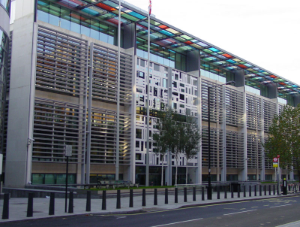New Parliamentary report finds asylum backlog increasing and IT failures could cost up to £1 billion
Parliament's Public Accounts Committee has published its report on reforming the UK border and immigration system.
You can read the 15-page report here.
 Image credit: UK GovernmentThe report generated plenty of media headlines, with the findings that the Home Office was failing to deal with a backlog of asylum cases and that the failure of major IT projects could end up costing up to £1 billion.
Image credit: UK GovernmentThe report generated plenty of media headlines, with the findings that the Home Office was failing to deal with a backlog of asylum cases and that the failure of major IT projects could end up costing up to £1 billion.
Reuters called it a "damning" report which found Britain's border and immigration system is a "mess".
The Guardian said the report found Britain's immigration system is "in chaos," while the Telegraph highlighted how the report found the backlog of asylum claims has rocketed by 70 per cent in the last year despite high-profile reforms by Home Secretary Theresa May.
In a press release, Margaret Hodge MP, Chair of the Committee of Public Accounts, said:
"The Home Office scrapped the UK Border Agency in March 2013 partly because its performance in dealing with backlog cases was not good enough.
However, the Department has also failed to get a grip on the long-standing problem of asylum backlogs, with some 29,000 applications dating back to at least 2007 remaining unresolved. In 11,000 of these cases people have not even received an initial decision on their asylum claim.
To make matters worse, the Department is also failing to meet its targets for dealing with newer claims, so it is now creating another backlog for itself. The number of claims awaiting an initial decision was up 70% to 16,273 in the first three months of 2014 compared to the same period last year.
It is deeply worrying that the Home Office is not tracking those people whose applications have been rejected to ensure that they are removed from the UK.
At the end of 2013-14 there were over 175,000 people whose application to stay in the UK had been rejected, and they are placed into a migration refusal pool to await removal.
The number of such cases has not been reduced over time. Some may have left the UK voluntarily, but without exit checks it is almost impossible to know.
It is particularly disturbing to find that, when the Department asked Capita to check over 250,000 case records in 2012 and 2013, Capita had been unable to contact over 50,000 people listed. The Department admitted that they did not know where these 50,000 people were.
The Department should, as a matter of urgency, take more steps to identify people that remain in the UK illegally and speed up their removal.
The failure of major IT projects designed to streamline process not only leaves the Department reliant on archaic systems but may also end up costing the taxpayer up to £1 billion. The cancellation of the Immigration Case Work programme and the e-Borders IT programme could mean a gobsmackingly awful figure being wasted.
The Home Office must put in place skilled, incentivised staff and sort out its data so it can crack the backlog and move people through the system. It must also go back to the drawing board and develop a comprehensive, system-wide IT strategy.
The pressure is on, and the Home Office must take urgent steps to sort out this immigration mess."
The Telegraph quoted Labour's Yvette Cooper as saying the report laid bare the Government's failure in the immigration system, with problems increasing since the Home Secretary scrapped the UK Border Agency and took direct control, while immigration minister James Brokenshire was quoted as blaming the "totally dysfunctional" immigration system the Government inherited.
"Turning around years of mismanagement has taken time, but it is now well underway. We have reformed visa routes to make them more resistant to fraud and cancelled failing contracts; and we are addressing the backlogs we inherited," Brokenshire said.
Refugee Action said in a statement that the report demonstrated how a massive reduction in access to advice and information for asylum seekers has created a false economy in the longer term.
"A lack of support means that asylum seekers don’t understand the complex system they’re expected to navigate. To avoid delays in future, it’s crucial to redesign the system based on an understanding of the experience of the people going through it," Refugee Action’s Chief Executive, Dave Garratt, said.
"Too many of the people Refugee Action sees are too busy worrying about how they are going to get enough to eat that day, when they should be able to concentrate on what is the most important legal process of their lives," he added.